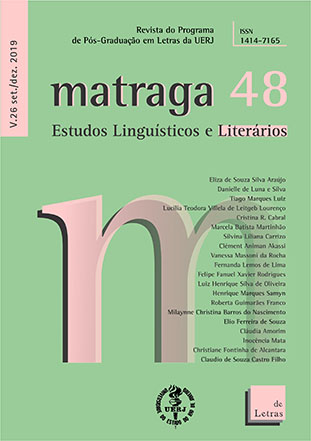Manuel Zapata Olivella, le muntu africain et la décolonisation des imaginaires et des épistémologies en Amérique Latine
DOI:
https://doi.org/10.12957/matraga.2019.45010Palavras-chave:
Manuel Zapata Olivella, muntu, postcolonialité/(afro-)décolonialité, sujet postcolonial, décolonisation de l’imaginaire.Resumo
Ce travail vise à montrer deux choses. La première, c’est de saisir toute l’importance du tournant postcolonial/afro-décolonial dans la construction d’une contre-épistémologie propre au sujet culturel colonisé africain. En d’autres termes, pour le sujet colonisé, cette contre-épistémologie sert à décoloniser les imaginaires, à partir d’un questionnement de la colonialité de l’épistémologie et du savoir donnés pour universels par l’occident. La deuxième chose, c’est que ̶ à quelques mois de la commémoration du centenaire de la naissance du prolixe et polygraphe auteur africain-colombien Manuel Zapata Olivella (1920-2004) ̶ cet article puisse le situer à sa juste place. Celle d’un sujet culturel colonisé africain des Amériques dont l’abondante production culturelle et la pensée, portées et révolutionnées par le concept de Muntu africain, participent de la décolonisation des imaginaires et de l’épistémologie.
----------------------------------------------------------------------------------------------
MANUEL ZAPATA OLIVELLA, O MUNTU AFRICANO E A DESCOLONIZAÇÃO DOS IMAGINÁRIOS E EPISTEMOLOGIAS NA AMÉRICA LATINA
Este trabalho tem dois objetivos. O primeiro deles é mostrar toda a relevância do giro pós-colonial/(afro)de-colonial na construção de uma contra-epistemologia própria ao sujeito cultural colonizado africano. Dito com outras palavras, para o sujeito colonizado tal contra-epistemologia desempenha a função de descolonizar os imaginários, a partir de um questionamento da colonialidade da epistemologia e do saber ocidentais voltados a uma perspectiva universal. O segundo objetivo é que ̶ quando faltam alguns meses da comemoração ao aniversário do prolixo e poligrafo autor africano-colombiano Manuel Zapata Olivella (1920-2004) ̶ este artigo possibilite colocá-lo em seu merecido lugar. O lugar de um sujeito africano nas Américas, cuja abundante produção cultural e de pensamento era influenciada pelo conceito de Muntu africano. Ao empregar este referencial africano em sua produção cultural, Olivella acaba por desencadear a descolonização dos imaginários e das epistemologias.
---
Original em francês.
Downloads
Downloads
Publicado
Como Citar
Edição
Seção
Licença
AUTORIZAÇÃO
A Matraga – Revista do Programa de Pós-Graduação em Letras da UERJ está autorizada a publicar o artigo ora submetido, caso seja aceito para publicação online. Fica atestado que a contribuição é original, que não está sendo submetida a outro editor para publicação, e que a presente declaração é a expressão da verdade.
Os trabalhos publicados no espaço virtual da Matraga – Revista do Programa de Pós-Graduação em Letras da UERJ serão automaticamente cedidos, ficando os seus direitos autorais reservados à Matraga. Sua reprodução, total ou parcial, é condicionada à citação dos autores e dos dados da publicação.

A Matraga utiliza uma Licença Creative Commons - Atribuição-NãoComercial 4.0 Internacional.





